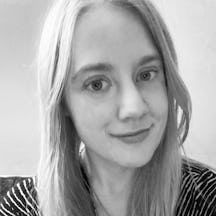Caroline Butterwick regularly draws on her life to illuminate her writing. Describing the reality of mental ill health has felt important personally and professionally. But sometimes it’s hard to decide what to share and what to keep to herself. Here Caroline explores the line between what’s public and what’s private, and how porous that boundary can be.
The boundaries that shape my writing
Words by Caroline Butterwickartwork by Kimberley Burrowsaverage reading time 5 minutes
- Article

The other night I was sitting around the dinner table with two friends and my husband. As we enjoyed our falafel burgers and chatted away – how life was going, our work, our plans – the topic of mental health came up.
I took a sip of my cider and wondered what I should say, or if I should say anything at all. But then things moved on, to my relief.
Now, these three people know that I’ve experienced mental illness. My husband has been there through the worst times, and the two friends visited me in hospital when I was at my most unwell, sitting with me in the patient dining room and walking laps of the grounds together.
Why did I hesitate to talk about mental health over dinner, with friends I have known for over a decade, people I am comfortable with?
I’m used to sharing my experiences, and the theme of mental illness permeates much of my writing. My PhD is on life writing and disability, creating a memoir where I share my lived experience of mental illness, as well as visual impairment.
I also regularly talk to mental health social-work students about how best they can support those they work with. Basically, I am used to mining my life, including – maybe even especially – the hard times.

“Why did I hesitate to talk about mental health over dinner, with friends I have known for over a decade, people I am comfortable with?”
Partly, I think my reluctance to speak at dinner was because the mentally unwell version of me feels like someone I’ve moved on from, to some extent at least. I haven’t been in hospital for a few years. While I still take medication, have support, and experience some symptoms, my life is different now. It’s no longer a sad carousel of appointments and admissions.
Talking about mental health takes me back to that place. And I wonder if it takes other people back, too, to a version of me that I want to keep in the past. Talking about hard times makes me feel vulnerable. And the emotions of the experience can rush back, and suddenly I feel exposed, the memories raw again.
The benefits of sharing
Still, writing and talking about difficult experiences is a key part of my work. And, of course, there are hugely positive sides to it. There is what writer Suzette A Henke terms “scriptotherapy” in her book ‘Shattered Subjects: Trauma and Testimony in Women’s Life Writing’.
Henke describes, “the process of writing out and writing through traumatic experience in the mode of therapeutic re-enactment”. There is the catharsis of writing about challenging times, and the sense of authorship that comes from being able to shape the narrative.
There is also the potential benefit to readers and listeners. I recently had an email from a woman who had read a magazine article of mine about finding myself again after mental illness. She shared how the piece resonated with her and what she’s been through.
It’s powerful to read something and see yourself reflected in another’s words.

“Talking about mental health takes me back to that place. And I wonder if it takes other people back, too, to a version of me that I want to keep in the past.”
As I read her message, it made me think: This is why I write. It’s powerful to read something – an article, an essay, a story, a poem – and see something of yourself reflected in another’s words. Writing can bring understanding, acceptance, hope.
I hope that my writing also helps those who haven’t got first-hand experience of disability or illness to understand what it’s like. Writing can make it real to others.
Self-care and boundaries
Writing and talking about my life is important to me, while being a challenge. How can I look after myself when I do choose to share?
Boundaries matter. I have thought about what I feel comfortable sharing, and, crucially, what I’d rather keep private. I reassess my boundaries regularly.
In the earlier days I was more open, with a sense of urgency about sharing what I had been through: the reality of being in hospital, of dealing with severe illness. But as the distance grows between the versions of me, I feel less confident talking about those times, certainly in detail.
Maybe it’s my own internalised prejudice. I see the life I have now and wonder if people who see the successful version of me would judge me harshly if they knew the reality of my past. Would I be taken less seriously? Would prospective employers think I’m too risky to take on?

“Boundaries matter. I have thought about what I feel comfortable sharing, and, crucially, what I’d rather keep private. I reassess my boundaries regularly.”
These things shouldn’t matter, but they do. It makes me question what I choose to put out there.
I think, too, about my audience. What will help them, or what could potentially be too upsetting, especially if they have been through similar things? I don’t want to offload my trauma on people.
Then there’s ethics. When writing or talking about real experiences, other people’s lives are irrevocably woven into my narrative. If I choose to share a difficult time, I need to think about how I protect the identities of those mentioned.
But it’s not just that. Reading about the hard times I’ve been through can be painful for those around me. My husband chooses not to read my work when I write about mental illness, as it reminds him too much of how challenging things were, the pain brought up, the memories stinging.
I stayed quiet while I had dinner with friends until the topic changed. I worried that bringing up my past would dampen the buoyant atmosphere, would make a fun evening less so.
It was also about my own self-preservation: I spend so much time writing about difficult experiences, it is okay for me to hold back sometimes. Rest is vital. If I’m to write about what I’ve been through, I need to get the balance right in my life. Maybe that way my words will matter even more.
About the contributors
Caroline Butterwick
Caroline Butterwick is a writer, researcher and freelance journalist based in North Staffordshire. She’s currently working on a nonfiction book proposal, and her freelance journalism has featured in a range of publications, including the Guardian, the i paper, Mslexia, and Psychologies. She is studying for a PhD in Creative Writing that explores the power of memoir as a counternarrative to dominant models of disability, funded by the Arts and Humanities Research Council/Midlands4Cities.
Kimberley Burrows
Kimberley is a blind abstract expressionist artist from Salford, Greater Manchester. An intuitive approach to her practice explores the complex themes of blindness, mental health, and art as therapy through performative mark-making. Kimberley is keen to understand the relationship between artist and medium, beyond the scope of vision, and the various health benefits that art can cultivate. Kimberley is a passionate advocate for accessibility and inclusion, which are both at the forefront of her social media presence. Kimberley, who will undertake a Master's degree in painting at the Royal College of Art, London later this year, has been featured in BBC Look North, Manchester Evening News, ITV News, the Daily Mail, and Marie Claire, among others.

